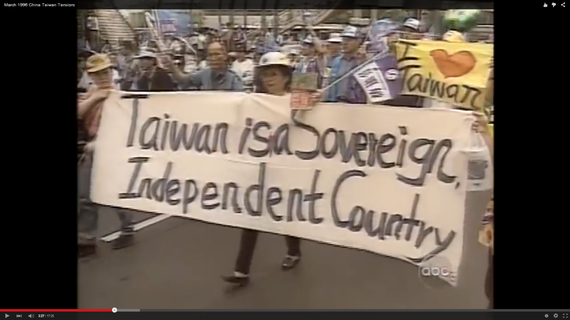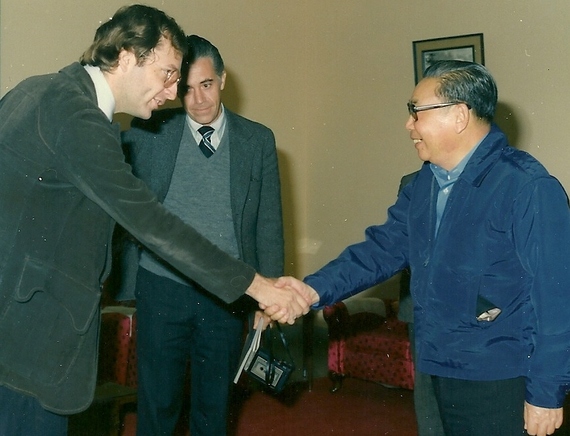 On May 20th, Taiwan will take another step in a democratic process begun thirty years ago - a process started under the rule of a dictator.
On May 20th, Taiwan will take another step in a democratic process begun thirty years ago - a process started under the rule of a dictator.
Tsai Ing-Wen will be sworn in as Taiwan's fourth democratically elected President and first woman to have ever held that office.
She appears to possess a quietly determined temperament. She will need it as she tackles a range of thorny challenges within Taiwan and from the Chinese mainland.
Tsai brings back to power Taiwan's Democratic Progressive Party (DPP), a party known in the past for angering Beijing and championing independence for the island of more than 23 million.
She is confronted with a population that is both very different from that on the Chinese mainland and yet one that is more intertwined with life and business on the mainland than ever before.
She will need to placate an ever more aggressive government in Beijing and a restless population at home that is suffering from a serious economic downturn.
But my perspective here goes back 40 years.
Ms. Tsai's passage to Presidency began with a ruthless and authoritarian ruler - a man who was in power when 20 year old Tsai was studying law at Taiwan National University. (She went on to other degrees at Cornell and the London School of Economics.)
Taiwan's leader was the son of President Chiang Kai-shek.
Known to some Americans as "G-mo," the "Generalissimo" had headed Nationalist [Kuomintang] rule of China from 1928 until he was ousted by the Communists and fled to Taiwan. There he ruled until his death.
I sat down with the Generalissimo's son for lunch on Saturday January 3rd 1976.
Chiang Ching-kuo had assumed most of his father's powers in the final years of the Generalissimo's life.
The elder Chiang, who died in April 1975, appointed his son head of the secret police in 1950, Defense Minister in 1965, and Premier in 1972.
I was expecting to meet a stern, formal, figure displaying an authoritarian streak. His father had certainly projected that image: thin, upright bearing, high Sun Yat-sen collar.
Chiang Ching-kuo struck me as an unimposing figure. He was dressed casually in a rumpled, loose fitting blue jacket. It was the kind of attire he felt brought him closer to the people. A genial smile on his face, he spoke over lunch of the remarkable economic growth of Taiwan.
For all his charm, Chiang ran his nation under strict "martial law." Taiwan opposition figures overseas described to me his ruthlessness. Over a period of fifteen years, he approved the arrest and torture of political prisoners. Activists held him responsible for many deaths. In 1976, he was still ordering the detention of political opponents; anyone criticizing his rule.
On the mainland, of course, the Cultural Revolution raged through its final years. Ailing, Mao Zedong was in his last year. Whatever human rights abuses Taiwan citizens endured, it was nothing compared to those across the Strait.
My colleague Bill Hartley of the Wall Street Journal joined me as we spent much of the day with Chiang in the city of Tai Chung, on the west coast of central Taiwan. Gateway to the mountains and Sun Moon Lake, Chiang said he liked to get away from the capital, broaden his political base, and promote his goal of Taiwan "self-reliance."
The Wall Street Journal portrayed Taiwan glowingly in early 1976. "Chiang leads an island 1/3 larger than the state of Maryland," Hartley wrote "yet a booming industrial nation - 9 % GDP growth per year and per capita income of $700 per year."
The island has of course changed remarkably. Today Taiwan tries to maintain 2 percent growth. Per capita income stands at $ 22,000. The Chinese mainland struggles to keep growth above 6 percent and reach a $ 9,000 a year per capita income.
That Chiang had dictatorial tendencies was not a surprise to anyone studying his background.
In 2000, former diplomat Jay Taylor (who I knew in Beijing and Havana) wrote a definitive biography of Chiang. "The Generalissimo's Son," provided a remarkable account of Chiang's education.
16 year old Ching-kuo was sent to Moscow in 1925. At the "Sun Yat-Sen University of the Toilers of China", Chiang met the 22 year old Deng Xiaoping who had just arrived from Paris after joining the new Chinese Communist Party. Taylor writes that Chiang was "fascinated by Deng and his days in Paris."
While Deng returned to China in January 1927 to rise in the ranks of the Communist Party, Chiang remained in Moscow (some have said he was a virtual hostage of Stalin) until 1937 when he returned to China with a Russian wife and a Marxist/Stalinist perspective on government.
The younger Chiang's authoritarian streak was on display well into the 1980's. He watched his classmate Deng Xiaoping rise to become the most powerful man in China by 1978 and begin to open up the nation the following year.
In 1985 Chiang was "re-elected" President in a typical dictator's poll with more than 95 % of the vote.
After that things began to change. It is likely that ill health pushed Chiang to look more carefully at his legacy and loosen his grip on power.
He did not oppose the founding of the Democratic Progressive Party in 1986. The Party which President-elect Tsai heads today was formed on a platform of "self-determination."
He provided Singapore leader Lee Kuan-yew, on a visit to Taipei in the summer of 1986, details of how he intended to transform Taiwan's political system. He wondered aloud if his reforms might influence the progress of democracy on the mainland.
In 1987, Chiang lifted 38 years of "martial law."
In short, as one writer put it: "before he died, the Generalissimo's son made himself the last dictator."
Two of Chiang's protégés became democratically elected Presidents.
In 1996, I covered the election of Lee Teng-hui, Chiang's independent minded Vice President. Beijing clumsily tried to influence the elections by military threat and intimidation. Lee won with 54 % of the vote. Gone were the days of contrived 95% victories.
Report from March 1996.https://www.youtube.com/watch?v=hghuZDuHph8
The evolution of democracy in Taiwan and Chiang Ching-kuo's role in it, makes one wonder about other authoritarians in Asia.
Might another Chinese leader make a rare historic move and usher in reforms?
It seems unlikely... as a new leader in Taipei begins to navigate the tricky political waters across the Taiwan Strait.

